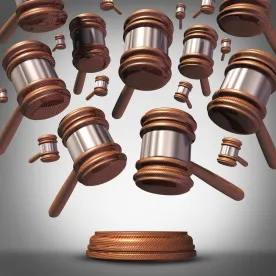Greetings, Court Fans!
We’re two weeks into October Term 2018 and it’s about time we touched base. It was a rather eventful off-season, with Justice Kennedy’s retirement and Justice Kavanaugh’s elevation, and we’ll have precisely nothing more to say about that. We do, however, have a retirement of our own to announce. After fourteen years of loyal Updating, Kim Rinehart is officially passing the torch this term. Kim sent her first Update to you all on September 28, 2004 (so long ago it may well have been by fax). Since then, she’s graced your inboxes nearly 500 times, summarizing over 1,100 decisions and countless (or, at least, uncounted) Orders and other news items. Kim will forever be a Court Fan and will no doubt pitch in during the annual June rush, but for now, we extend our gratitude and respect for her many years of dedicated SCOTUS wonkery. Kim’s last words in this medium: “I want to thank all of you for following the Court with me for so many years. It has been an honor and a privilege to bring you what I hope has been objective and helpful coverage of the issues. I know that the Update is in exceedingly good hands going forward!” We endorse about two-thirds of that statement. Godspeed, Kim!
Assuming the Supreme Court continues to function in Kim’s absence, it’ll have to decide some cases. Since the end of last term, the Court has granted cert in only a few new cases, but that may change now that it’s back to full strength. For now, here are the handful of cases that at least four justices felt warranted attention, picked from the enormous pile of cert petitions that amassed over the summer:
-
Thacker v. Tennessee Valley Authority (No. 17-1201) asks (1) whether the Eleventh Circuit erred in applying a “discretionary-function exception” borrowed from the Federal Tort Claims Act (rather than the test set forth in Federal Housing Authority v. Burr (1940)) to test the immunity of “sue and be sued” entities like the TVA; and (2) whether in any case the Eleventh Circuit correctly applied the discretionary-function test.
-
Home Depot U.S.A. v. Jackson (No. 17-1471) asks (1) whether an original defendant to a class-action claim that was first asserted as a counterclaim against a co-defendant can remove the class action to federal court under the Class Action Fairness Act; and (2) whether the Supreme Court’s holding in Shamrock Oil & Gas v. Sheets (1941)—that an original plaintiff may not remove a counterclaim against it—extends to third-party counterclaim defendants.
-
Azar v. Allina Health Services (No. 17-1484) asks whether the Department of Health and Human Services must conduct notice-and-comment rulemaking before providing instructions to a Medicare Administrative Contractor that makes initial determinations of payments due under Medicare, when those instructions rest on a non-legally-binding administrative interpretation of a relevant statutory provision.
-
Rimini v. Street Inc. v. Oracle USA Inc. (No. 17-1625) asks whether the Copyright Act’s allowance of “full costs” to a prevailing party is limited to taxable costs under 28 U.S.C. §§ 1920 and 1821, or if it also authorizes non-taxable costs.
-
Tennessee Wine & Spirits Retailers Association v. Byrd (No. 18-96) asks whether the 21st Amendment empowers states, consistent with the dormant commerce clause, to regulate liquor sales by granting retail or wholesale licenses only to individuals or entities that have resided in-state for a specified time.
We’ll have more on these cases—and any others the Court decides first—when the time is ripe. Until next time!





 />i
/>i

